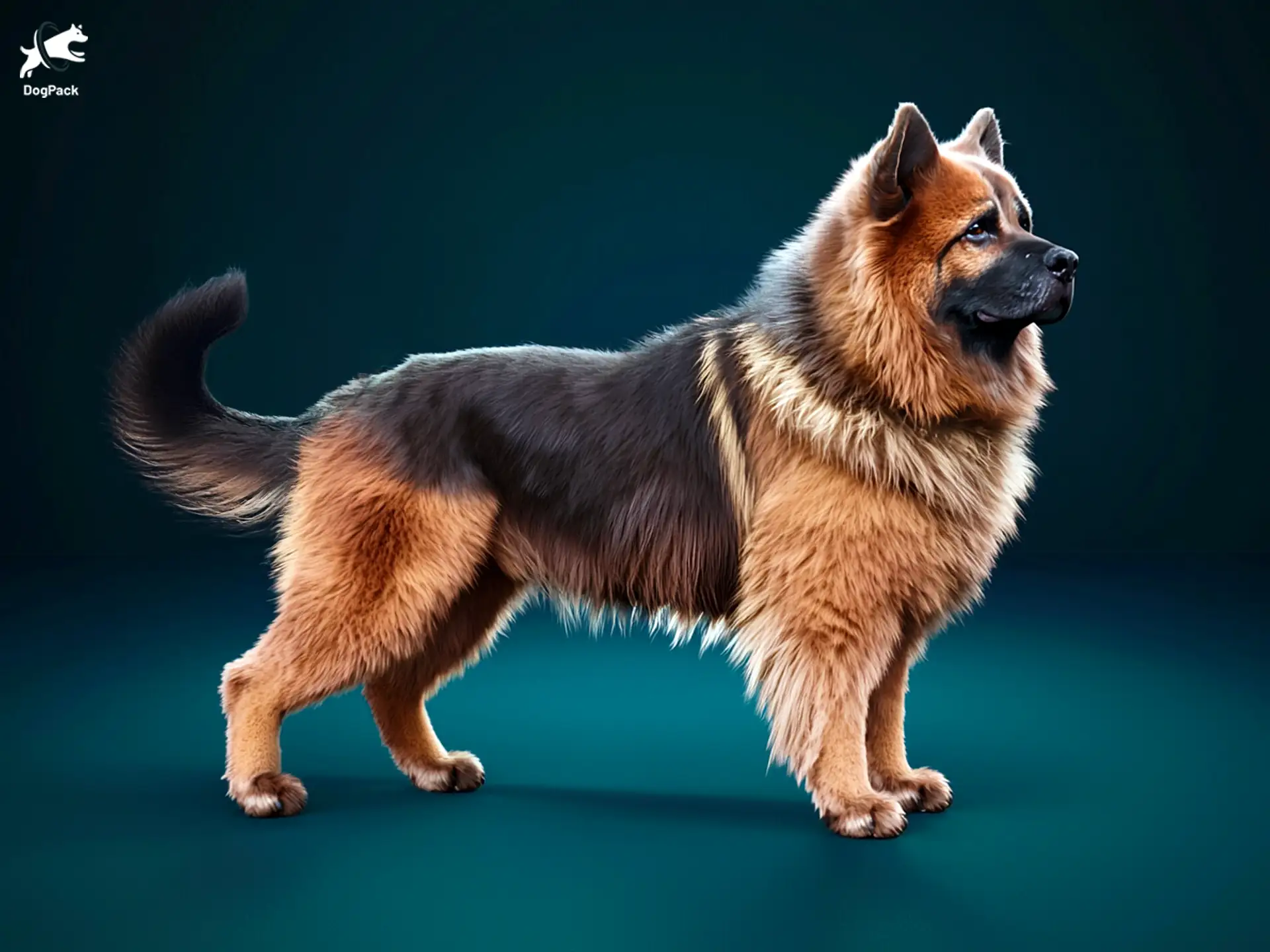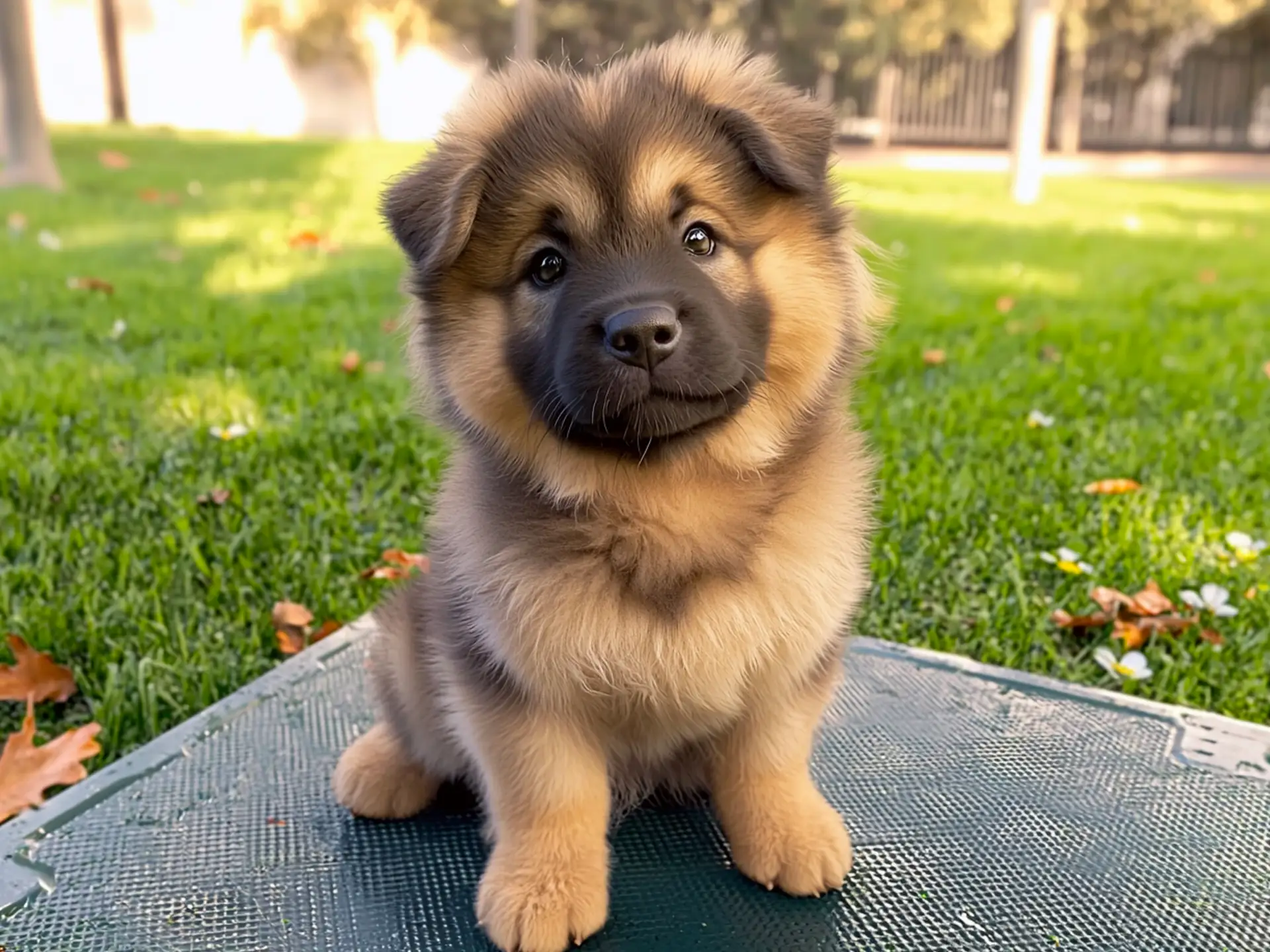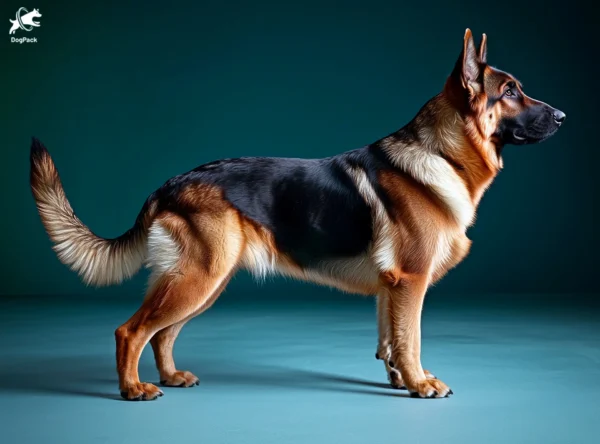Chow Shepherd Dog Breed Info & Overview
The Chow Shepherd, a blend of the noble Chow Chow and intelligent German Shepherd, combines loyalty, protective instincts, and a striking appearance. This hybrid offers both brains and brawn, making it an ideal choice for those seeking a devoted, vigilant companion. With its unique look and steadfast nature, the Chow Shepherd is a wonderful match for owners who appreciate a dog that’s as loyal as it is capable.
Characteristics
Pictures
Breed History
The Chow Shepherd is a fascinating blend of two distinguished breeds: the Chow Chow and the German Shepherd. While the Chow Shepherd itself doesn’t have a long history, its parent breeds boast rich backgrounds. The Chow Chow, one of the oldest dog breeds, originated in ancient China over 2,000 years ago, revered for its lion-like appearance and guarding abilities.
On the other hand, the German Shepherd was developed in Germany in the late 19th century, primarily for herding sheep and guarding flocks. Known for their intelligence and versatility, German Shepherds quickly became popular worldwide for various roles, including police and military work. The combination of these two breeds aims to create a dog that is both intelligent and protective.
The Chow Shepherd likely emerged in the United States during the growing interest in designer breeds. Breeders sought to blend the best traits of the Chow Chow and German Shepherd, resulting in a loyal, protective, and intelligent companion. Though not recognized by major kennel clubs, the Chow Shepherd has been steadily gaining admirers.
Temperament, Personality
The Chow Shepherd is known for its loyalty and protective nature. Inheriting traits from both parent breeds, these dogs are often devoted to their families and can be wary of strangers. Their protective instincts make them excellent watchdogs, always alert and ready to guard their home.
While they are affectionate with family members, Chow Shepherds may be reserved or aloof with people they don’t know. Early socialization is crucial to ensure they develop into well-rounded adults. They can get along with children and other pets if raised together, but supervision is recommended due to their strong personalities.
Intelligent and sometimes independent, the Chow Shepherd benefits from consistent training. They enjoy mental stimulation and thrive when given a job to do. With the right guidance, they make loving and loyal companions who are deeply connected to their owners.
Physical Characteristics
The Chow Shepherd is a striking dog, often displaying a blend of physical traits from both parents. They typically have a sturdy, muscular build, standing between 22 and 26 inches tall and weighing anywhere from 45 to 90 pounds. Their appearance can vary, but many have the thick double coat of the Chow Chow and the athletic body of the German Shepherd.
Coat colors can range widely, including black, brown, tan, red, and even blue. Some Chow Shepherds may inherit the Chow Chow’s signature blue-black tongue and the German Shepherd’s pointed ears. Their eyes are usually almond-shaped and expressive, reflecting their intelligent nature.
With their thick coats, Chow Shepherds have a majestic presence. Their tails may curl over the back like a Chow Chow or be straighter like a German Shepherd. Overall, they are handsome dogs that often turn heads wherever they go.
Health Issues
Like all breeds, Chow Shepherds can be prone to certain health issues inherited from their parent breeds. Hip dysplasia is a common concern, especially given their size and build. Regular veterinary check-ups and maintaining a healthy weight can help mitigate this risk.
They may also be susceptible to elbow dysplasia, eye conditions like progressive retinal atrophy, and certain skin issues. Thyroid problems and bloat are other potential health concerns. Being aware of these possibilities allows owners to monitor their Chow Shepherd’s health proactively.
Ensuring that you obtain your Chow Shepherd from a reputable breeder who conducts health screenings can reduce the likelihood of inherited conditions. Regular exercise, a balanced diet, and routine veterinary care are essential to keeping your Chow Shepherd healthy and happy.
Grooming Needs
With their thick double coats, Chow Shepherds require regular grooming to keep them looking their best. Brushing them at least two to three times a week helps remove loose hair and prevents matting. During shedding seasons, daily brushing may be necessary to manage the extra fur.
Bathing should be done as needed, typically every few months unless they get particularly dirty. Overbathing can strip the natural oils from their skin, leading to dryness. Pay special attention to their ears, keeping them clean and checking for signs of infection.
Regular nail trimming and dental care are also important. Given their strong jaws, providing dental chews and brushing their teeth can help maintain oral health. Grooming sessions are a great opportunity to bond with your Chow Shepherd and keep them comfortable.
Exercise Requirements
Chow Shepherds have moderate to high energy levels and need regular exercise to stay happy and healthy. Aim for at least 1 to 2 hours of physical activity each day, including walks, playtime, and mental stimulation. This helps prevent boredom, which can lead to unwanted behaviors.
They enjoy activities that challenge both mind and body, such as agility training, obedience classes, or interactive games. Given their intelligence, incorporating training into exercise sessions can be particularly rewarding for them.
Providing a secure, fenced area for them to run and explore is beneficial. However, they can adapt to various living situations as long as their exercise needs are met. Regular outings and new experiences also help with socialization.
Training Tips
Training a Chow Shepherd requires consistency, patience, and positive reinforcement. They are intelligent but may exhibit stubbornness at times, especially if they inherit the independent streak of the Chow Chow. Early training and socialization are key to raising a well-behaved dog.
Use reward-based methods, offering praise, treats, and affection to encourage desired behaviors. Harsh training techniques are not effective and can damage the trust between you and your dog. Keeping training sessions short and engaging helps maintain their interest.
Enrolling in obedience classes can provide structure and help with socialization. Remember that building a strong bond with your Chow Shepherd will make training more successful and enjoyable for both of you.
Nutrition, Diet
Feeding your Chow Shepherd a high-quality diet is essential for their overall health. Due to their size and activity level, they require a balanced diet rich in protein to support muscle development and energy needs. Choose a dog food formulated for large breeds with appropriate nutrient levels.
Portion control is important to prevent overeating and obesity, which can exacerbate joint issues like hip dysplasia. Typically, an adult Chow Shepherd may consume between 3 to 4 cups of dry food per day, divided into two meals. Adjust portions based on age, activity level, and individual metabolism.
Consulting with your veterinarian can help tailor a diet plan specific to your Chow Shepherd’s needs. Avoid feeding table scraps or foods high in fat and sodium. Always provide fresh water, and consider supplements like glucosamine and chondroitin if recommended by your vet.
Adoption, Breeders
If you’re interested in adding a Chow Shepherd to your family, consider both adoption and purchasing from a reputable breeder. Rescue organizations occasionally have Chow Shepherds in need of homes. Adopting can be a rewarding experience and provide a loving home to a dog in need.
When choosing a breeder, ensure they prioritize the health and temperament of their dogs. They should provide health clearances for both parent breeds and allow you to meet the puppies and their mother. Ask questions about breeding practices and socialization efforts.
Resources like the Chow Shepherd Lovers Group and local breed clubs can help you find reputable breeders. Remember to avoid puppy mills or sellers who cannot provide proper documentation or answer your questions thoroughly.
Family Pet?
Chow Shepherds can make excellent family pets for the right households. They are loyal and protective, forming strong bonds with their family members. With proper socialization, they can get along well with children, though supervision is recommended due to their size and strength.
They may be less tolerant of rough play, so teaching children how to interact respectfully is important. If raised with other pets, Chow Shepherds can coexist peacefully, but their protective instincts may make them territorial with unfamiliar animals.
Overall, the Chow Shepherd thrives in families that understand their needs and are willing to invest time in training and socialization. They are best suited for homes where they are included as part of the family and given plenty of attention.
Right For You?
Deciding if a Chow Shepherd is right for you involves considering your lifestyle and experience with dogs. They require consistent training, regular exercise, and an owner who can provide leadership. If you’re an experienced dog owner looking for a loyal companion, they may be a great fit.
These dogs do best in homes with space to roam and owners who can commit time to their care. They may not be ideal for first-time dog owners or those living in small apartments without access to outdoor areas.
Ultimately, if you’re prepared to meet the Chow Shepherd’s needs and appreciate their unique blend of traits, you’ll find a devoted and protective companion in this breed.
Conclusion
Bringing a Chow Shepherd into your life can be a rewarding experience filled with loyalty and companionship. This hybrid combines the best qualities of the Chow Chow and German Shepherd, offering intelligence, protection, and affection. If you have the time and dedication to invest in their care, the Chow Shepherd might just be the perfect addition to your family.
FAQs
-
Are Chow Shepherds known to be protective?
Yes, Chow Shepherds often have a strong protective instinct from both parent breeds. They tend to be loyal to their families and may act as effective watchdogs, though early socialization is important to manage any overly protective tendencies.
-
What are some ideal activities for a Chow Shepherd?
Chow Shepherds enjoy activities that challenge both their mind and body, such as hiking, obedience training, and agility. Their intelligence and energy levels make them ideal companions for active owners who enjoy outdoor pursuits.
-
What type of coat care does a Chow Shepherd need during shedding season?
During shedding season, Chow Shepherds benefit from daily brushing to remove loose fur and prevent matting. Using a de-shedding tool helps manage their dense coat, keeping both their skin and fur healthy, especially in warmer months.
-
Are Chow Shepherds suited for first-time dog owners?
Chow Shepherds may be challenging for first-time owners due to their independent and sometimes stubborn nature. Experienced handlers who can provide firm, consistent training and meet their exercise needs are often best suited for this breed.
-
How adaptable are Chow Shepherds to new environments?
Chow Shepherds are generally adaptable but benefit from a stable routine. Gradual introductions to new places or people help them adjust comfortably, especially when they feel secure with their owner’s guidance in unfamiliar settings.
Breed Ratings
The Chow Shepherd is intelligent, thanks to its German Shepherd lineage, but may exhibit stubbornness from the Chow Chow side.
They enjoy playtime with family but can be somewhat reserved. Engaging activities help bring out their playful nature.
With moderate to high energy levels, Chow Shepherds need regular exercise to stay happy and prevent boredom.
Their thick double coat sheds moderately to heavily, especially during seasonal changes. Regular grooming is essential.
They may have a moderate prey drive, so caution is advised around small animals. Early socialization can help manage this trait.
Due to their dense coat, grooming can be time-consuming. Frequent brushing is needed to prevent matting and control shedding.
While intelligent, they can be stubborn. Patience and positive reinforcement are key to successful training.
Chow Shepherds prefer companionship and may develop separation anxiety if left alone for long periods.
They may bark to alert their owners but are not typically excessive barkers. Proper training can manage vocal tendencies.
Generally, Chow Shepherds are not heavy droolers, but some individuals may drool slightly, especially in hot weather.
With proper socialization, they can get along with other dogs but may be territorial. Early introductions are beneficial.
Prone to certain health issues like hip dysplasia, but with proper care and regular vet visits, they can remain healthy.














